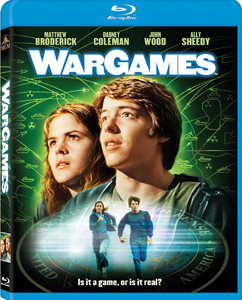“WarGames” (1983) is one of the most influential films about hacking and artificial intelligence. Being almost a kids’ film, and appropriate enough for the whole family, it drew a lot of viewers into a world they didn’t know about. Because the film never strays from its computer themes nor treats them trivially, it’s a touchstone of the subgenre.
Tech films are served well by having heart, and that comes from Seattle-area teens David and Jennifer. David is played by Matthew Broderick, dorkier than Ferris Bueller but equally adept at phreaking (hacking into a computer system connected to a phone line) and changing his grades.
Jennifer is played by Ally Sheedy, more outgoing than her “Breakfast Club” character. Although a welcome presence, Jennifer is mostly a symbol that a nerdy guy can impress a cute girl via skills in anything, as Napoleon Dynamite would later theorize. Writers Lawrence Lasker and Walter F. Parkes strain to show the teens’ naivete, like when Jennifer pronounces trajectory “tragic-torie.”

“WarGames” (1983)
Director: John Badham
Writers: Lawrence Lasker, Walter F. Parkes
Stars: Matthew Broderick, Ally Sheedy, John Wood
The purity of the hacking portrayal is a strength of director John Badham’s film, as we see David’s steps and thought process that end with him playing a Global Thermonuclear War against a national-defense computer nicknamed Joseph.
(SPOILERS FOLLOW.)
Although there was no internet in 1983, there was a primitive workaround “internet” for savvy people. David sees a magazine ad for a new computer game and would like to get the code in order to play it. (Today, that’s theft, but it was considered morally ambiguous at the time, so David is safely the film’s hero.) He knows only the company’s city of operation. Calling the operator gets him the area code and prefixes. He has a program call up all the possible numbers (a process that takes a day or so) until he finds the company’s number.
The only winning move is not to play. But where’s the fun in that?
Then he accesses the gaming company’s intranet via the phone line and runs into the only thing early hackers had to deal with: the password. For some reason, passwords back then were one word. I guess the primary “security system” was the general public’s ignorance of how tech works. David and Jennifer guess the password is the game creator’s son’s name – granted, this requires old-fashioned library research – and then they are in.
In “WarGames,” hacking is something anyone can do if they have patience and smarts, but it rings true. Seeing the process is crucial for our early buy-in, and then the suspense of David being pursued by the feds (a common plot in the hacker genre) carries us from there.

Soon “WarGames” gets to its other major computer theme: artificial intelligence. Ironically, the script’s intelligence plummets here as we run into sci-fi hand-waving and plot conveniences. The now-reclusive Professor Falken (John Wood) programmed Joseph to learn via game-playing, so presumably Joseph knows it’s a game, just like David does.
But inexplicably, the game is transmitted to NORAD officials as being the real thing. Joseph’s lead techie recognizes the glitch and tells his bosses in the nick of time. But for some reason he is unaware the game is still running, so the same thing happens again. And this time the movie encourages us to think the attack might be real (even though Joseph can’t control what the Soviets do), leading to the grand finale with a rather arbitrary ticking clock.
We might be somewhat distracted from the sloppy plotting by David and Jennifer being on the run, and a side trip to Falken’s private island, where the depressive Falken decides he’s going to let humans destroy themselves because why fight the inevitable? (See, this movie isn’t so dated after all.)
How about a nice game of tic-tac-toe?
Jennifer and David talk Falken into helping them via their appealingly innocent hope for the future. The writers find mild humor in generational differences, with Jennifer noting that the 41-year-old Falken is quite old – likely designed to get a chuckle out of parents who took their kids to “WarGames.”
Then the themes get enriched one last time as David realizes if he teaches Joseph tic-tac-toe, a game that always ends in a tie unless one side is an idiot, Joseph will realize the futility of nuclear warfare. Thank god Joseph interprets “tie” as “everyone loses.” If he interpreted it as a fun game where no one goes home disappointed – the type of ironic mistake an AI might make – then he would’ve destroyed the world.
“WarGames” is enjoyable the less you think about it, illogical the more you think about it. But there’s no quibbling with the message that nuclear war is moronic. It’s naïve to think governments or individual military leaders just need to hear that from Hollywood in order to change their ways (as is the case with Barry Corbin’s General Beringer here).
On the other hand, the question of whether humans (flawed but, well, human) or computers (logical but susceptible to glitches and hacks) should have the final call in launching nukes is compelling throughout “WarGames.” The film actually encouraged the Reagan government to think about this issue.
Lasker and Parkes make an intense plot out of the unplottable. If the movie didn’t do so much hand-waving over the part where Joseph inexplicably oversteps his bounds and why no one at NORAD can tell a simulation from reality, it could’ve been a masterpiece. Even so, “WarGames’ ” influence remains substantial; indeed, the “Mission: Impossible” film series will likely get into the nuances of AI behavior in its 2025 installment.

